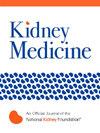慢性肾脏疾病的后部可逆性脑病综合征:国家队列的发病率、结局和危险因素
IF 3.4
Q1 UROLOGY & NEPHROLOGY
引用次数: 0
摘要
基本原理及后部可逆性脑病综合征(PRES)是一种急性神经系统疾病,如果不及时治疗,可导致严重的并发症,如脑出血。慢性肾脏疾病(CKD)患者发生PRES的风险增加;然而,目前尚不清楚这种风险主要是由合并症引起的,还是肾功能不全本身是一个独立的危险因素。本研究旨在评估与无肾脏疾病患者相比,跨CKD阶段PRES的发生率、结局和资源利用。研究设计采用全国住院病人样本数据库进行回顾性研究。设置,参与者:2016年至2019年非选择性入住PRES的成年患者。结果:全因住院死亡率、PRES住院发生率、住院发病率(脑出血、缺血性卒中、脑疝和癫痫持续状态)和医疗资源利用(住院时间和住院总费用)分析方法采用调查设计方法进行多变量logistic和线性回归分析。结果该队列包括12605例患者,占所有入院患者的0.014%。PRES发病率从2016年的0.013%上升到2019年的0.015% (P = 0.01),并与CKD分期进展呈剂量反应关系。PRES的主要危险因素包括女性、白人、高血压、转移性癌症、实体器官移植、风湿病、物质使用障碍、颈动脉狭窄、偏头痛和脑动脉粥样硬化。肾衰竭(KF)与住院死亡率密切相关(aOR 5.12, 95% CI, 2.09-12.53, P <;0.001)。CKD/KF患者与无肾脏疾病患者的住院时间、总住院费用和神经系统并发症发生率相似。管理数据的使用限制了对详细临床信息的访问。残留的混杂因素仍有可能存在。这是迄今为止CKD人群中最大的PRES研究。CKD与PRES密切相关,且存在剂量-反应关系,KF是院内死亡率的独立危险因素,强调需要在这一人群中提高临床警惕性。后可逆性脑病综合征(PRES)是一种严重的脑部疾病,如果不及时发现和治疗,可导致癫痫发作、精神错乱甚至死亡。然而,它经常被忽视,因为它的症状可能是模糊的。虽然PRES通常与高血压和免疫系统疾病有关,但它与慢性肾脏疾病(CKD)的关系尚不清楚。这项研究使用了一个大型的国家数据库来检查慢性肾病患者发生PRES的频率及其对他们健康的影响。研究结果表明,随着肾脏疾病的恶化,PRES的风险增加,肾衰竭患者是最脆弱的。这些结果强调了早期识别和密切监测CKD患者以改善其护理的必要性。本文章由计算机程序翻译,如有差异,请以英文原文为准。
Posterior Reversible Encephalopathy Syndrome in Chronic Kidney Disease: Incidence, Outcomes, and Risk Factors in a National Cohort
Rationale & Objective
Posterior reversible encephalopathy syndrome (PRES) is an acute neurological condition that, if untreated, can result in severe complications, such as intracerebral hemorrhage. Patients with chronic kidney disease (CKD) are at an increased risk of developing PRES; however, it is unclear whether this risk is primarily driven by comorbid conditions or if renal dysfunction itself is an independent risk factor. This study aimed to evaluate the incidence, outcomes, and resource utilization of PRES across CKD stages compared with patients without kidney disease.
Study Design
A retrospective study using the Nationwide Inpatient Sample Database.
Setting & Participants
Adult patients nonelectively admitted with PRES from 2016 to 2019.
Exposures
Different stages of CKD versus no kidney disease
Outcomes
All-cause in-hospital mortality, Incidence of PRES hospitalizations, in-hospital morbidity (intracerebral hemorrhage, ischemic stroke, brain herniation, and status epilepticus), and health care resource utilization (length of hospital stay and total hospitalization charges)
Analytical Approach
Multivariate logistic and linear regression analyses were conducted using survey design methods.
Results
The cohort included 12,605 patients, representing 0.014% of all admissions. PRES incidence increased from 0.013% in 2016 to 0.015% in 2019 (P = 0.01) and demonstrated a dose-response relationship with CKD stage progression. Key risk factors for PRES included female sex, White race, hypertension, metastatic cancer, solid organ transplantation, rheumatologic disorders, substance use disorders, carotid artery stenosis, migraines, and cerebral atherosclerosis. Kidney failure (KF) was strongly associated with in-hospital mortality (aOR 5.12, 95% CI, 2.09-12.53, P < 0.001). The length of stay, total hospitalization charge, and rates of neurological complications were similar between CKD/KF and patients without kidney disease.
Limitations
The use of administrative data limits access to detailed clinical information. Residual confounding factors remain possible.
Conclusions
This is the largest study to date on PRES in CKD populations. CKD is strongly associated with PRES, with a dose-response relationship, and KF is an independent risk factor for in-hospital mortality, emphasizing the need for heightened clinical vigilance in this population.
Plain-Language Summary
Posterior Reversible Encephalopathy Syndrome (PRES) is a serious brain condition that can cause seizures, confusion, and even death if not recognized and treated in time. However, it is often overlooked because its symptoms can be vague. While PRES is commonly linked to high blood pressure and immune system diseases, its connection to chronic kidney disease (CKD) has been unclear. This study used a large national database to examine how often PRES occurs in people with CKD and its impact on their health. The findings show that the risk of PRES increases as kidney disease worsens, with patients in kidney failure being the most vulnerable. These results highlight the need for early recognition and close monitoring of patients with CKD to improve their care.
求助全文
通过发布文献求助,成功后即可免费获取论文全文。
去求助

 求助内容:
求助内容: 应助结果提醒方式:
应助结果提醒方式:


